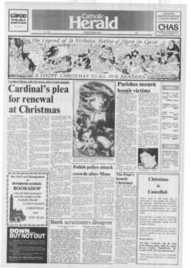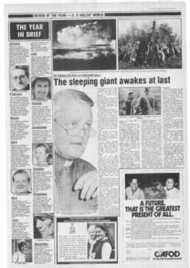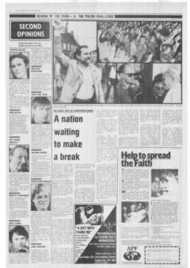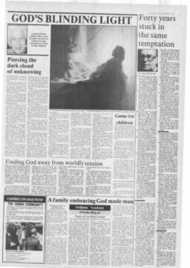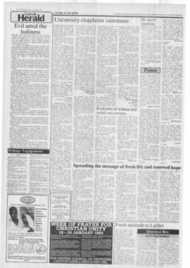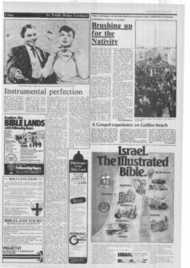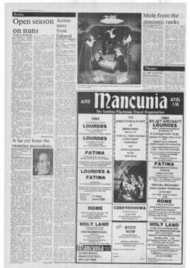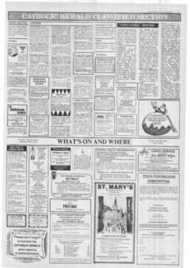Page 7, 23rd December 1983
Page 7
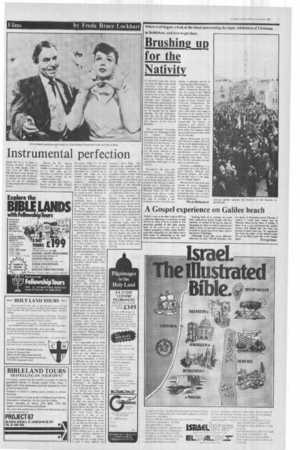
Report an error
Noticed an error on this page?If you've noticed an error in this article please click here to report it.
Tags
Share
Related articles
Two Cheers For Mary Whitehouse
Love, They Say, Conquers
Schoolboys And The Fear Of Faith
Pride Of Power
Dail To Bring In Bill To Aid Film Industry
Catholic Herald
Instrumental perfection
HERE WE are at the dawn of George Orwell's doom-laden year of 1984. Really„ 1983 is over. Even the 1983 London Film Festival is over, though by no means done with. lt exposed or restored so many treasures, they will go on influencing cinema programmes for many a month. Already the five "missing Hitchcocks", the five classic thrillers he consigned to storage ten or more years ago arc beginning to reach the cinemas after being restored for the London Film Festival.
Rear Window (PG, Plaza 2, Screen on the Hill, Chelsea Classic) as always an immaculate Hitchcock thriller. It's the one starring James Stewart as a news photographer incarcerated in his apartment by a broken leg in plaster, who finds his rear window strategically sited to observe his neighbours' rear windows . . . through binoculars or telephoto lens. He lies there visted from time to time by his nurse (Thelma Ritter at her down-to-earth chattiest) or his girl-friend (Grace Kelly).
Today it is a perfect Hitchcock classic, a typically sinister murder mystery set in a design of lines as cool and clean as Grace Kelly's beauty, Hitchcock's judgment perfecting the just balance between austere fascination with crime and his own mischievous humour.
The result is like a lovely piece of chamber music with every instrument doing its bit and contributing to the tension.
Another famous hit which had been reconstituted for and shown at the Festival was the George Cukor musical version of A Star is Born ("U", Gate, Notting Hill) starring Judy Garland and James Mason. This version had disappeared because the distributors, Warner Brothers, had ordered thirty minutes out of the original, a mutilation which made Cukor disclaim his film.
Now the thirty minutes have been restored, which gives Miss Garland a coliple of unfamiliar numbers by Harold Arlen and Ira Gershwin as well as the memorable "Born in a Trunk". The restoration was undertaken largely by the staff of the guilty Warner Bros in association with the Academy of Motion Picture Arts and Sciences, in an operation akin to Kevin Brownlow's research for his restoration of Napoleon.
The effort has I think been worth while if only for giving the world public another and fuller performance by Judy Garland. She was after all one of the great artists created by and in the cinema; and the original "straight film" which starred Janet Gaynor and Fredric March in a story part-authored by the great director William Wellman was a Hollywood classic if a sentimental treatment of a true situation.
It is impossible not to relish the irony of the contract starlet's (Garland) introduction to the studio where every department greets her with "Glad to have you with us," and proceeds to ignore her completely. It would be difficult, too, not to feel the double irony of the part being played by Judy Garland, herself a tragic victim of the Hollywood system. Mason, of course, does his usual skilled job.
The Festival entry I Most regretted having missed was Schlesinger's An Englishman Abroad. We are unlikely, I fear, to see it early in the cinema, for it has already been shown on television. Although I don't like seeing cinema movies on television, I was grateful to the BBC for showing us this most brilliant film. As most people know, the idea for Alan Bennett's screenplay came to him from Coral Brown's description to him of her encounter with the arch-traitor Guy Burgess in Moscow, where she was playing Gertrude in our visiting National Theatre's Hamlet; while he was a Foreign Office official until he and his colleague Maclean defected to
t he Russians (almost unbelievably the Foreign Office is said to have shipped his furniture after him). This seemed to me another perfect piece of movie team-work with all the parts working as smoothly as a Swiss watch: Alan Bennett's script with the main performances; Coral Brown as herself thirty years earlier, and Alan Bates as the wretched wreck the traitor had become.
know the argument that no such film should have been made lest it create sympathy for Burgess. I find the argument inadequate. I was moved to tears by the film, but in no way on the traitor's account. What moved me was the accurate pin-pointing of the truth about treachery and its miserable agent, nailed down by the writer in the encounter of Burgess, in Alan Bate's devastating study, with the healthy normality and humanity of the Australian actress at her handsome best. My tears were not for Burgess but were the effect of that dramatic capture of the truth. This would have been my "Critic's Choice" from the new movies at this year's Festival.
blog comments powered by Disqus


